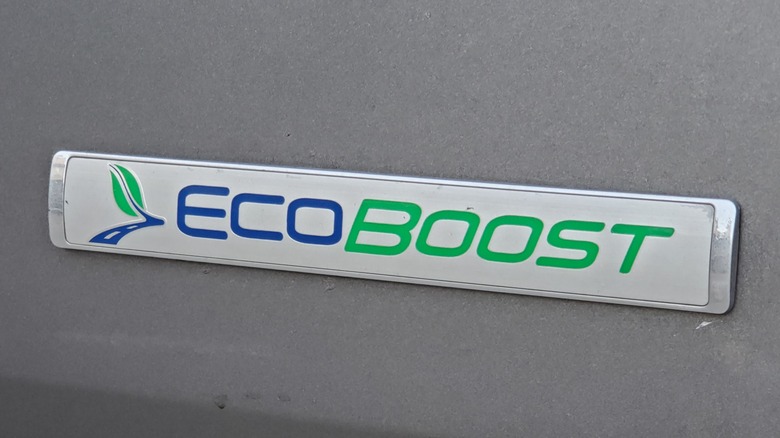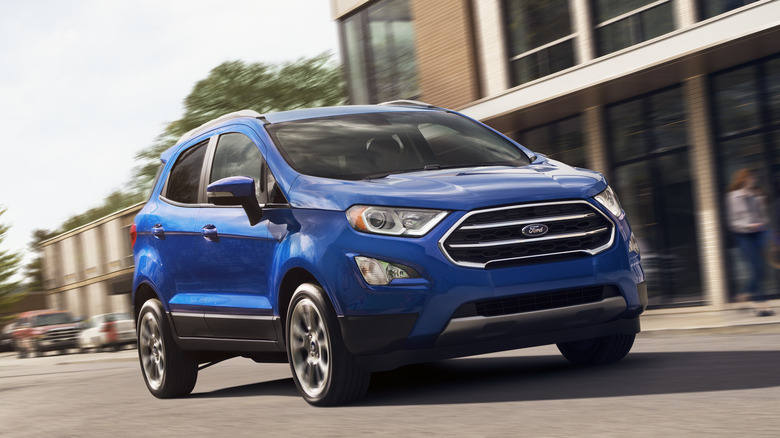How Reliable Are Ford's EcoBoost Engines?
Unless you're driving a V8 Mustang, electric vehicle, or a truck, chances are that your modern Ford has some variant of an EcoBoost engine. That's Ford's name for its line of turbocharged engines that are designed from the ground up to be both relatively powerful and fuel efficient.
Given the fact the engine line has been around since 2009, it begs asking how reliable Ford's tech really is? Ford is one of the largest automakers in the world that has pumped out a lot of EcoBoost motors over the years, and it's worth knowing whether or not you can rely on an engine from the Big Blue Oval.
The EcoBoost name has been given to a wide variety of engines, and determining the reliability of each and every engine would be next to impossible. That said, there are things you should be looking for if you are thinking of buying a truck, SUV, or car powered by one of Ford's turbocharged wonders.
Avoid the 1.0-liter EcoBoost
There is definitely an EcoBoost powerplant you should steer clear of unless you have a lot of powertrain warranty left. That would be the 1.0-liter, three-cylinder engine that was found in the Ford Fiesta and Ford EcoSport.
It's not that the engine is a slacker in the performance department, either. It was well-received for offering a lot of power and relative efficiency given its size. However, the 1.0-liter's real downfall comes from it's overly complicated design. Engineers and mechanics from all over will tell you that adding parts and complexity reduces reliability.
The 1.0-liter uses a "wet" timing belt that's built directly inside the engine assembly, and is lubricated by engine oil. Other timing belt mechanisms are "dry" systems that are not lubricated. The "wet" system, while perfectly fine in working conditions, becomes a total mechanical nightmare when trying to do any maintenance whatsoever — it often involves removing the engine from the car.
Additionally, tear-downs of 1.0-liter EcoBoosts have revealed that the "teeth" on the timing belt can remove themselves from the belt and clog the oiling system, causing all sorts of mayhem. The engine is too complex for its own good, especially considering the fact it's mostly featured in economy cars, and not models that would likely be held to a rigorous (and expensive) maintenance schedule.
It's not all grim news for EcoBoost
Although the 1.0-liter EcoBoost may be less than exemplary, that doesn't mean other engines bearing the EcoBoost badge are dismal as well. In fact, just about all of Ford's current lineup of vehicles are powered by an EcoBoost of varying displacements. You don't have much choice in the matter either way if you're buying a Ford.
As far as reliability is concerned, an EcoBoost engine shouldn't give you too much fuss; as long as you buy something more recent that is either brand-new, or well taken care of. According to data from Consumer Reports, newer common Fords, like the Ford Escape, Explorer, F-150, and Maverick from the past two and three model years have relatively few reported issues with the engines themselves. Most of the complaints are either directed the transmission specifically, or other parts of the car.
As with all engines — ranging from hand-built supercar powerplants that were tuned by artisans, to the dullest commuter four-banger — if you keep up to date with manufacturer-suggested maintenance and treat your car well, it will likely be reliable and serve you for many thousands of miles.


